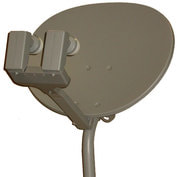 The Over-the-Air Reception Devices (OTARD) Rule was created to promote a fair and competitive consumer television reception market. The OTARD Rule (47 C.F.R. Section 1.4000) has been in effect since October 1996, and it prohibits restrictions that impair the installation, maintenance or use of antennas used to receive video programming. Check out the FCC website for more information. The OTARD Rule Covers: A “dish” antenna that is one meter (39.37”) or less in diameter (or any size dish if located in Alaska) including direct-to-home satellite dishes, TV antennas, wireless cable antennas and customer-end antennas that receive and transmit fixed wireless signals The OTARD Rule applies to most state and local laws and landlord or community association rules that contain dish restrictions that: • Unreasonably delay or prevent installation, maintenance or use. • Unreasonably increase the cost of installation, maintenance or use. • Preclude a person from receiving or transmitting an acceptable quality signal from an antenna covered under the Rule. A consumer’s use of a covered dish antenna is protected by the OTARD Rule if: • Placement of a dish is in the resident’s (owner or renter) exclusive use area, such as a balcony, deck, garden, yard or patio. • Placement of a dish is wholly within the user’s exclusive use area. State and local laws and landlord and community association rules generally CANNOT: • Require prior approval or a permit. • Require any type of permit or prior approval fee. State and local laws and landlord and community association rules generally MAY: • Ban the use of a dish in a common area or if any part of the dish protrudes or hangs into a common area, such as a walkway or garden, outdoor siding, windowsill, etc. • Suggest a location for the dish as long as there is the ability for exceptions if an acceptable quality signal cannot be received in the preferred location. • Indicate a preference for camouflaging the dish (i.e. painting or shrubbery shield), as long as the requirement would not unreasonably delay installation or unreasonably increase the cost of installation, maintenance or use. Comments are closed.
|
Archives
June 2024
|

 RSS Feed
RSS Feed
